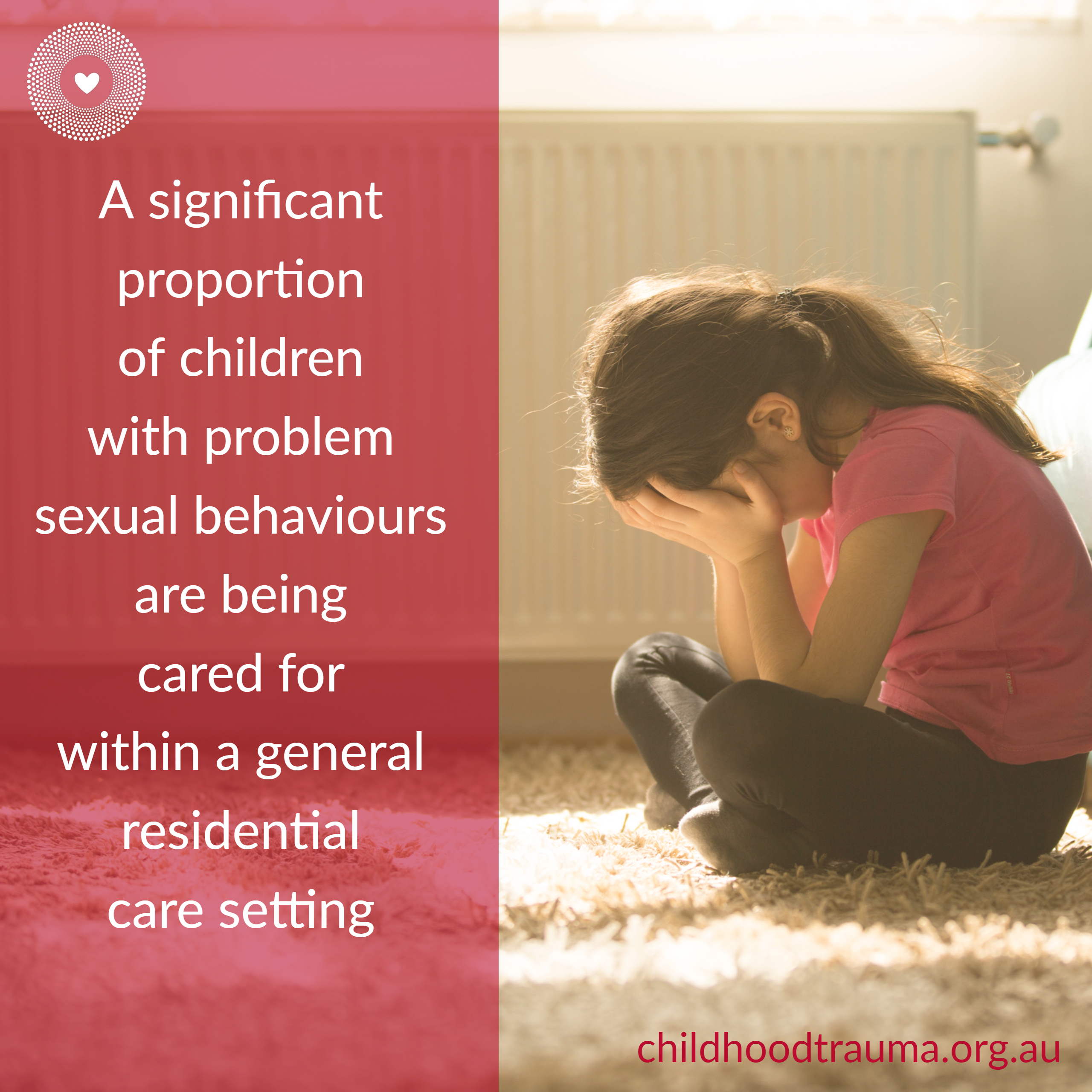
Problem Sexual Behaviours in Children Under Twelve – what do we know and what do we need to know in supporting our residential care workers
This blog entry was authored by Lisa Grobleben,
Team Leader Therapeutic Care Program
at the Australian Childhood Foundation
Residential care workers are immersed in the sharp end of child protection work, charged with caring for children displaying complex trauma based behaviours, often including problem sexual behaviours. At times, these carers undertake this task alone, with access to limited support and supervision. The prevalence of children in residential care displaying problem sexual behaviours is considered significant, with Crooks et all (2005) finding that of their sample of 20 children under the age of 12 exhibiting problem sexual behaviours, 23.5% resided in residential care, the second largest group behind children residing with a single biological mother at 41.2%.
 In examining the existing literature base to determine what we know about residential carers experiences of working with children displaying problem sexual behaviours, it became apparent that there was a dearth of literature available. Given the requirement for residential care workers to provide care to children over a twenty-four period, including potentially high-risk times of bed/bath times, and often unsupported, it is surprising that their role in working with this group of children has not been more thoroughly examined. Within the existing literature, several themes emerged in relation to a range of professionals working with children with problem sexual behaviours, including levels of anxiety and fear in professionals working with this group of children, with Farmer (2004) suggesting that professional’s anxiety and fear in relation to sexualised behaviours leads to actively avoiding or minimising concerning behaviours. Lack of knowledge and understanding, and training in the management of problem sexual behaviours was a consistent theme amongst the literature, and insufficient knowledge amongst caring professions were seen to result in a ‘catastrophise or minimise’ reaction (O’Brien, 2010) resulting in harmful responding to children.
In examining the existing literature base to determine what we know about residential carers experiences of working with children displaying problem sexual behaviours, it became apparent that there was a dearth of literature available. Given the requirement for residential care workers to provide care to children over a twenty-four period, including potentially high-risk times of bed/bath times, and often unsupported, it is surprising that their role in working with this group of children has not been more thoroughly examined. Within the existing literature, several themes emerged in relation to a range of professionals working with children with problem sexual behaviours, including levels of anxiety and fear in professionals working with this group of children, with Farmer (2004) suggesting that professional’s anxiety and fear in relation to sexualised behaviours leads to actively avoiding or minimising concerning behaviours. Lack of knowledge and understanding, and training in the management of problem sexual behaviours was a consistent theme amongst the literature, and insufficient knowledge amongst caring professions were seen to result in a ‘catastrophise or minimise’ reaction (O’Brien, 2010) resulting in harmful responding to children.
The identification of these themes however tended to be on examination of professionals in general, with very little focus within the current literature base relating to how frontline residential care staff understand problem sexual behaviours in young children, with a greater focus on how these behaviours are understood within the clinical treatment and foster care context. Literature that did specifically examine the residential care context was often focused on children who displayed sexually harmful behaviours and children who were older in age. Given findings indicate a significant proportion of children with problem sexual behaviours are being cared for within a general residential care setting, these themes require further exploration.
The research I am undertaking, under the supervision of the University of Portsmouth, is looking to broaden our understanding of how we best support our frontline residential care workers to respond to children who are displaying problem sexual behaviours. This includes developing an understanding of levels of anxiety and confidence in their responding, and the factors that influence these levels such as age, level of educational attainment or training received, and their understanding of developmentally normative behaviours in comparison to problem sexual behaviours, and how this understanding has been reached. Data is being collected via an online questionnaire that is accessed through the Qualtrics software program, consisting of approximately 22 questions, and all data collected is anonymous and confidentially maintained.

Given the sensitive nature of the research topic, a full ethics review was undertaken, and the research questionnaire has been designed in such a way that participant responses are based on hypothetical case studies, to negate the need for any disclosure of confidential client information. I’m excited to find out what we can learn, and how we can better support our residential carers in responding to problem sexual behaviours in young children. If you are currently working in residential care, and would like to anonymously and confidentially participate in this piece of research, please contact me on lisa.grobleben@myport.ac.uk for further information.
References:
Crooks, C., Fernandez, R., Topham, A., Acton, W., Brotzel, D., Swart, G., VanMeyel, R. (2005). Children under 12 years with sexual behaviour problems in London and Middlesex County: Trends and professionals’ perceptions. Centre for Research on Violence Against Women and Children. Retrieved by clicking here O’Brien, W. (2010). Australia’s response to sexualised or sexually abusive behaviours in children and young people. Australian Crime Commission. Retrieved from clicking here Farmer, E. (2004). Patterns of placement, management and outcome for sexually abused and/or abusing children in substitute care. British Journal of Social Work, 34, 375-393. DOI: 10.1093/bjsw/bch043
